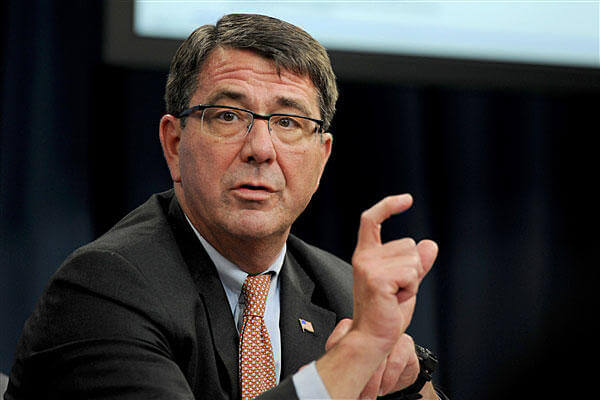The U.S. Senate has overwhelmingly approved Ashton Carter to become the next secretary of defense.
The upper chamber on Thursday voted 93-5 in favor of his nomination to replace Chuck Hagel, the former Republican senator from Nebraska, as the top civilian at the Defense Department. He is expected to start work on Tuesday.
Carter, 60, who has a doctorate degree in theoretical physics, never served in the military but held senior positions at the Pentagon, including chief weapons buyer and deputy secretary of defense. He emerged as the front-runner for the top position last year after Hagel made a surprise announcement that he planned to resign from the post in less than two years in the job.
Hagel reportedly fought with National Security Adviser Susan Rice and other White House officials over micromanagement of the Pentagon and how best to fight militants affiliated with the Islamic State in Iraq and Syria (ISIS). He stumbled out of the gate when he drew blistering criticism during his confirmation hearing from former GOP colleagues, many of whom bristled at his opposition to the U.S.-led war in Iraq.
By contrast, Carter's confirmation hearing last week was largely devoid of sharp questioning from lawmakers.
He drew bipartisan praise for indicating he was likely to favor sending lethal weapons to Ukraine to fight Russia. He also said he would seek to maintain an independent voice in shaping the drawdown of U.S. troops in Afghanistan, as well as a long-term strategy against the Islamic State.
In written responses to senators' questions, Carter said military pay, benefits and a health system better synched with the Veterans Administration were critical to recruit and retain troops.
"Providing an appropriate pay and benefits package is essential to this task, but compensation and benefits costs must be balanced with readiness and modernization requirements," he wrote.
The five senators who opposed his nomination were all Republicans: Roy Blunt of Missouri, Mike Crapo and Jim Risch of Idaho, Mark Kirk of Illinois and John Boozman of Arkansas.
--Richard Sisk contributed to this report.
-- Brendan McGarry can be reached at brendan.mcgarry@military.com




























